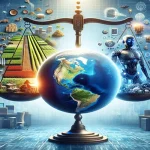Introduction
Artificial intelligence has revolutionized global healthcare, transforming diagnosis, treatment, and disease prevention into data-driven disciplines. As governments and corporations race to adopt AI innovations, a new moral dimension has emerged — one where technology meets policy and philanthropy.
Celebrities, once known for entertainment and advocacy, are now investing in AI-driven healthcare solutions, merging compassion with innovation. Together, they are shaping a global health narrative that blends science, ethics, and influence.
AI and the Transformation of Medical Science
AI is reshaping the medical field through predictive algorithms that detect diseases earlier and enhance treatment precision. Machine learning models now analyze imaging scans faster than radiologists, while AI-assisted tools support personalized medicine and genetic research.
From cancer diagnostics to pandemic response, artificial intelligence is enabling breakthroughs that once seemed decades away — yet it also demands new global standards for medical ethics and data use.
The Role of Global Policy in Healthcare Innovation
Governments worldwide are realizing that AI-driven healthcare requires strong policy frameworks. Nations such as the United States, South Korea, and the United Kingdom have introduced AI healthcare regulations focusing on patient privacy, data security, and algorithmic accountability.
At the same time, developing nations are seeking partnerships with tech giants to improve access to digital healthcare, signaling a growing recognition that AI can bridge — or widen — global inequality gaps.
Celebrity Philanthropy and Technological Impact
Philanthropic initiatives led by global icons such as Angelina Jolie, Leonardo DiCaprio, and Serena Williams are expanding beyond traditional charity. These figures are funding AI-based projects that address child health, mental well-being, and global disease prevention.
Their involvement not only brings financial resources but also visibility — turning complex medical innovations into mainstream conversations that inspire public support and awareness.
AI Ethics and the Human Side of Medicine
Despite its transformative potential, AI in healthcare raises critical ethical questions. Can algorithms truly understand empathy? Should machines be trusted to make life-and-death decisions?
Medical professionals argue that while AI enhances precision, it must complement — not replace — the human touch that defines compassionate care. Ethical AI frameworks are now seen as essential to maintaining humanity within technological medicine.
The Global Drive for AI Health Equality
AI has the potential to democratize healthcare, especially in underserved regions. Mobile health platforms powered by AI can diagnose illnesses in remote areas, offering a digital lifeline where doctors are scarce.
However, unequal access to technology risks deepening global disparities. Ensuring that AI benefits all populations, regardless of wealth or geography, is becoming a moral imperative for world leaders and global health institutions.
Celebrity-Led Collaborations in Medical Innovation
Celebrities are partnering with universities, AI startups, and medical research organizations to fund technological breakthroughs. Projects backed by artists and athletes are supporting mental health AI systems, disease-tracking algorithms, and wearable tech innovations.
Their influence has made AI-driven healthcare a public priority, demonstrating how fame can accelerate research and human progress.
FAQs
How is AI changing the healthcare industry?
AI improves diagnosis accuracy, personalizes treatment, and speeds up research through data-driven analysis and automation.
Why is global policy crucial in AI healthcare?
Policies ensure ethical practices, protect patient data, and establish accountability for medical AI systems.
What role do celebrities play in healthcare innovation?
They provide funding, visibility, and advocacy for AI projects that enhance global health outcomes.
Can AI replace doctors?
No, AI supports doctors by improving precision, but human judgment, empathy, and ethics remain irreplaceable.
How can AI reduce healthcare inequality?
By expanding access to digital diagnostics and telemedicine in low-income and rural regions worldwide.
Conclusion
The intersection of AI, policy, and celebrity philanthropy is redefining global healthcare. What once belonged solely to science is now a collective effort powered by innovation, compassion, and influence.
As humanity advances deeper into the digital century, the true test will be ensuring that technology serves healing — not hierarchy — and that progress in medicine remains guided by empathy as much as intelligence.





